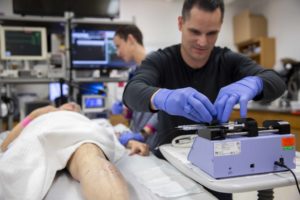Steven Romero
Steven Romero, Ph.D.
Associate Professor
PHAN Engagement Coordinator
Physiology and Anatomy
steven.romero@unthealth.edu
Education
- Postdoctoral Fellowship, Clinical Integrative Physiology University of Texas Southwestern Medical Center
- Ph.D., Integrative Cardiovascular Physiology University of Oregon
- M.S., Kinesiology University of Texas at San Antonio
- B.S., Kinesiology University of Texas at San Antonio
Curriculum Vitae
Lab Website
Personal Bio
Dr. Romero grew up in the small town of Socorro, Texas. Dr. Romero completed his undergraduate studies at the University of Texas at San Antonio and completed his doctoral training at the University of Oregon under the mentorship of Dr. John Halliwill. Dr. Romero then completed a post-doctoral fellowship with Dr. Craig Crandall at the University of Texas Southwestern Medical Center and the Institute for Exercise and Environmental Medicine (IEEM) in Dallas. Currently, Dr. Romero is an Assistant Professor in the Department of Physiology and Anatomy and is an Associate Scientist at the IEEM. In his down time, Dr. Romero enjoys the outdoors, bbqing, and watching track and field while enjoying a good craft beer. Dr. Romero also enjoys quality coffee and is always happy to use his barista skills to provide a delicious beverage to research participants after their experiments.
Research Interests
The Romero Lab has two broad research themes. The first theme centers on investigating how the human vascular system adjusts and adapts to exercise and environmental stress in healthy and diseased populations. The second theme centers on examining the vascular and functional maladaptations that accompany various diseases (e.g. hypertension, aging, peripheral arterial disease), in addition to developing novel therapies that may mitigate such detrimental changes.
Research Keywords
Heat therapy, vascular function, blood pressure regulation, healthy aging, hypertension, functional capacity
Current Projects
Investigations in the Romero Lab are currently focused on the use of heat therapy to improve blood pressure control in older women with hypertension, to protect against endothelial ischemia-reperfusion injury, and to improve skeletal muscle blood flow and function and capacity. The Romero Lab is also examining the contribution of endoplasmic reticulum stress in the pathophysiology of hypertension.
Current Funding
- R01 AG059314 Fu/Romero (PI) 03/01/2019 – 12/31/2023 “Chronic Lower Leg Heating for the Treatment of Hypertension in Older Women” The goals of this study are to investigate the blood pressure lowering effect of home-based lower leg heat therapy in older women with hypertension, and to examine the impact of this therapeutic modality on neural-vascular health in these patients. Role: MPI (grant shared equally with Qi Fu MD, PhD, University of Texas Southwestern Medical Center)
- R01 AG059314 02S1 Fu/Romero (PI) 08/01/2020 – 12/31/2021 “Chronic Lower Leg Heating for the Treatment of Hypertension in Older Women” The goal of this administrative supplement is to leverage our existing clinical trial in order to perform a proof-of-concept investigation to examine the effects of home-based lower leg heat therapy on AD/ADRD risk, as reflected by changes in cerebrovascular function and proteomic biomarkers in older women with hypertension. Role: MPI (grant shared equally with Qi Fu MD, PhD, University of Texas Southwestern Medical Center)
Selected Publications
Click here for a complete list of publications (https://tinyurl.com/y88sdrem)
Teaching Interests
- Muscle Physiology
- Hemodynamics
- Cardiovascular Response to Exercise and Environmental Stress
UNT Health Committees and Service
- 2020 – Present: Member, North Texas Regional Institutional Review Board
- 2019 – Present: Member, Women’s Cardiovascular and Brain Health Symposium Organizing Committee
- 2018 – Present: Member, Early Career Development Committee
National/International Committees and Service
- 2020 – Present: Member, Diversity and Inclusion Committee. The American Physiological Society
- 2017 – Present: Editorial board. American Journal of Physiology – Regulatory, Integrative and Comparative Physiology



Social media